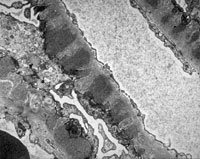 Clinical trials evaluating the efficacy of various therapies of membranous nephropathy is a tricky business, given the natural history of the disease: because about 1/3 of patients spontaneously remit, it is often difficult to say that a patient’s positive response was indeed due to the intervention being tested, and large numbers of patients (something often difficult to find) are difficult to find. In general, the current approach is generally to try a 6-month period of “conservative therapy” characterized by RAAS blockade with ACE-Is and/or ARBs. If patients do not achieve a remission, a trial of immunomodulatory therapy–typically steroids/Cytoxan or steroids/CNIs–is attempted. Given the multiple side effects and only partial efficacy of the above regimens, other alternatives are sorely needed.
Clinical trials evaluating the efficacy of various therapies of membranous nephropathy is a tricky business, given the natural history of the disease: because about 1/3 of patients spontaneously remit, it is often difficult to say that a patient’s positive response was indeed due to the intervention being tested, and large numbers of patients (something often difficult to find) are difficult to find. In general, the current approach is generally to try a 6-month period of “conservative therapy” characterized by RAAS blockade with ACE-Is and/or ARBs. If patients do not achieve a remission, a trial of immunomodulatory therapy–typically steroids/Cytoxan or steroids/CNIs–is attempted. Given the multiple side effects and only partial efficacy of the above regimens, other alternatives are sorely needed.
One such alternative is rituximab (Rituxan), a monoclonal antibody against the B-cell antigen CD20. A recent review in C-JASN by Bomback et al describes the current literature for the use of Rituxan in the treatment of membranous nephropathy. Taken together, all the data describes in total 85 patients–with most patients coming from either a group at the Mayo Clinic (Dr. Fervenza) or Italy (Dr. Remuzzi)–which admittedly is not enough to come to any firm conclusions about the use of Rituxan in MN. The response rates for Rituxan in these trials was similar to those for Cytoxan and CNIs–about 15-20% for a complete remission (CR) and about 35-40% for a partial remission–which may be quite good considering that many patients in these trials had already “failed” Cytoxan or CNIs prior to enrollment. However, the authors conclude that there is insufficient evidence to use Rituxan as a first-line agent for the treatment of MN and that a randomized controlled trial will be necessary to address this possibility.

